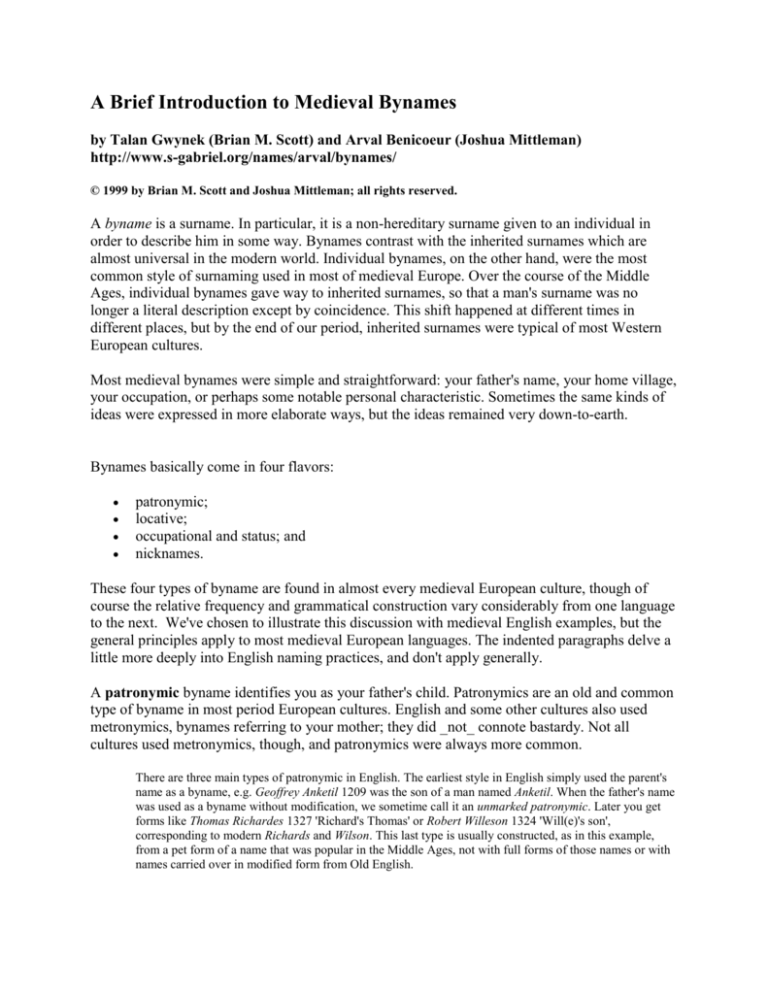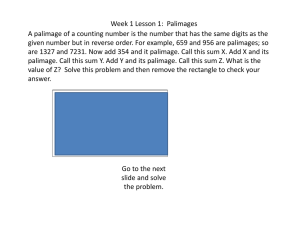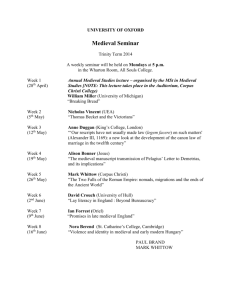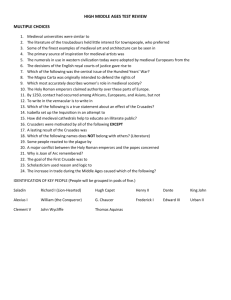
A Brief Introduction to Medieval Bynames
by Talan Gwynek (Brian M. Scott) and Arval Benicoeur (Joshua Mittleman)
http://www.s-gabriel.org/names/arval/bynames/
© 1999 by Brian M. Scott and Joshua Mittleman; all rights reserved.
A byname is a surname. In particular, it is a non-hereditary surname given to an individual in
order to describe him in some way. Bynames contrast with the inherited surnames which are
almost universal in the modern world. Individual bynames, on the other hand, were the most
common style of surnaming used in most of medieval Europe. Over the course of the Middle
Ages, individual bynames gave way to inherited surnames, so that a man's surname was no
longer a literal description except by coincidence. This shift happened at different times in
different places, but by the end of our period, inherited surnames were typical of most Western
European cultures.
Most medieval bynames were simple and straightforward: your father's name, your home village,
your occupation, or perhaps some notable personal characteristic. Sometimes the same kinds of
ideas were expressed in more elaborate ways, but the ideas remained very down-to-earth.
Bynames basically come in four flavors:
patronymic;
locative;
occupational and status; and
nicknames.
These four types of byname are found in almost every medieval European culture, though of
course the relative frequency and grammatical construction vary considerably from one language
to the next. We've chosen to illustrate this discussion with medieval English examples, but the
general principles apply to most medieval European languages. The indented paragraphs delve a
little more deeply into English naming practices, and don't apply generally.
A patronymic byname identifies you as your father's child. Patronymics are an old and common
type of byname in most period European cultures. English and some other cultures also used
metronymics, bynames referring to your mother; they did _not_ connote bastardy. Not all
cultures used metronymics, though, and patronymics were always more common.
There are three main types of patronymic in English. The earliest style in English simply used the parent's
name as a byname, e.g. Geoffrey Anketil 1209 was the son of a man named Anketil. When the father's name
was used as a byname without modification, we sometime call it an unmarked patronymic. Later you get
forms like Thomas Richardes 1327 'Richard's Thomas' or Robert Willeson 1324 'Will(e)'s son',
corresponding to modern Richards and Wilson. This last type is usually constructed, as in this example,
from a pet form of a name that was popular in the Middle Ages, not with full forms of those names or with
names carried over in modified form from Old English.
A locative byname identifies you by the place where you live, work, or were born, or by the land
you own. There are two broad categories of locative: toponymic and topographical.
A toponymic byname refers to a named place, i.e., it incorporates a proper noun.
Up to about 1400 the usual English form is de X, where X is the name of a town, though in speech de was
probably replaced by of; examples are de York 1324 and de Brunnesley 1198. After c.1400 the preposition
was simply dropped, and indeed it wasn't always used even in earlier records (e.g., Richard Wangeford
1296).
Topographical bynames refer to features of the local landscape, either natural or man-made. In a
sense, your byname is your address: It tells people where you live or where you work.
In general, someone was named after a large place only after he left it: The name Simon Welsche
1279 wouldn't distinguish a man from every other Simon in Wales; but it was apparently a good
identifier in Bedfordshire where Welshmen were rare. People were usually named after large
places when they had moved a long distance. On the other hand, Richard Overthegate 1327
would hardly have been a useful identifier if Richard ventured more than a few miles away from
the gate for which he was named.
By far the most common preposition in medieval English usage was at, generally combined with the
definite article as atte 'at the' (or some minor variant). Typical examples are Attewode 1243 'at the wood'
and Attemille 1242 'at the mill'. Many other prepositions also occur: Vnderegge 1194 'under edge', for
someone who lived at the foot of an escarpment, Overthebek c.1270 'over the beck (i.e., stream)', Bithewaye
1243 'by the way', for someone who lived by the road, and in theffelde 1333 'in the field' are good
examples. Just about the _least_ common preposition is of, though it does occur once in a while, e.g., othe
felde 1327 'of the field'. In most cases the preposition (and article, if present) were eventually lost; the full
forms are rare after c.1400. In a few cases they were fused with the noun, as in the modern names Atwood,
Attwater, and Underhill.
Occupational and status bynames identify you by an occupation or rank. In this category we
include both literal identifications, like John Smith for a man who was a smith, and figurative
descriptions, like Agnes le Pope c.1230, who certainly was not the Pope! Something about her
behavior led people to give her that byname, which could well have been sarcastic or even
insulting.
Up to about 1400 these are often found in English with the definite article, which is almost always written
as the French le or la, though that probably doesn't represent spoken usage. Some typical examples are
Ysabelle la Lauendere 1253 'the laundress', le Fithelare 1275 'the fiddler', le Horsmongere 1279 'horsedealer', and le Bakere 1177 'the baker'. Bynames referring to rank and station also appear with the article, as
in le Freman 1221 'the freeman', le Erl 1255 'the earl', and Agnes le Pope c.1230 'the pope', but there are
also many early examples without it, e.g., Henry Pope 1296 and any number of 13th century examples of
the byname Kyng.
An important category overlaps between locative and status bynames: ethnic bynames. These are
bynames which identify you by your nationality, religion, or ethnic group. In many cases, they
are based on much smaller regions than the nationalities we used in the modern world, right
down to cities and towns. William le Bret 1230 was a Breton or Briton, while Hugh le Pycard
1276 was from Picardy in northwestern France.
Nicknames are a grab-bag of all bynames that don't fit into any of the first three classes, but
some common types can be identified. In this class we include nicknames describing physical,
mental, or moral characteristics of the bearer. Many were derogatory and others were ironic:
although they appear to be complementary, they were not. For example, Henry Bigge 1177 might
have been a small man. The most common nicknames were very simple and concrete: Hamo le
Reed 1296 'the red', Roger le Wis 1203 'the wise'. Others were more abstract: Gilbert Wysdom
1243, Walter Boost 1327 'boast'. A common category was metonymic bynames, which identified
your occupation by naming a tool you used or a product you produced or sold. Thomas Mayle
1296 could have been a maker of mail armor and Geoffrey wythe Hameres 1303 'with the
hammers' was a maker or user of hammers rather than a man who owned some notable hammers.
More complex names existed in some languages, including English, though they were always less common.
Here are some interesting English examples: Wythe Berd 1297 'with the beard' (actually mis-spelled
Wychthe Berd), Braz de fer 1205 'iron-arm'; Smalbyhind' 1379 'small behind'; Shirloc 1159 'bright-lock,
i.e., fair-haired', now Sherlock; Yrento 1209 'iron-toe'; le Oneyede 1293 'the one-eyed'; le Long 1290-92;
Cunteles 1219 'cunt-less'; le Lechur 1249 'the lecher'; Wysheued 1327 'wise-head'; le Gidye 1219 'the mad'
(now giddy, with much weakened sense); Wytelas 1275 'witless'; le Gode 1212 'the good'; le Cruel 1251; le
Wilfulle 1275; Notegood 1375 'not good'; Swetemouth 1327 'sweet mouth'; Foulmouth 1286.
Other English descriptive bynames refer to articles of clothing, e.g., Wytebelt 1307 'white belt',
Wythemantel 1297 'with the mantle'; Scortmantil 1312 'short mantle'. In some cases, like Gilbert Hodde
1225 'hood', such bynames may be occupational rather than physically descriptive: Gilbert may have been a
maker of hoods. Robert Rotenheryng 1297 'rotten herring' was probably a fish-seller!
Other conditions not falling into any of the foregoing categories can be described by nicknames:
John le Wyfles 1327 presumably had no wife. Occasionally one finds nicknames apparently
commemorating a particular event, like Falinthewol 1301 'fall in the well', though this particular
name is found often enough to make us wonder whether it embodies some popular expression;
perhaps it refers to a dreamer or a very clumsy person. Perhaps a better example is the rather
cryptic Latethewaterga 1242 'let the water go', about which one could produce endless
conjectures! In general, though, these complex, cryptic nicknames are rare. They didn't exist in
every language.
Particularly interesting are the English nicknames of 'Shakespeare' or 'pickpocket' type: Brekelaunce 1334
'break lance'; Hakkeches' 1227 'hack cheese', for a cheesemonger; Makepais 1219 'make peace';
Mangeharneis 1228 'eat harness, i.e., armor'; Singgemasse 1187 'sing mass'; Brekebac 1269 'break back';
cuttepurs 1275 'cut purse'; John Fillecunt 1246 'fill cunt' (who might have had difficulty with Bele
Wydecunthe 1327!); and Strokelady 1327 'stroke lady'. Other types of phrases, sometimes even more
elaborate, were sometimes used: Agnes Singalday 1309 'sing all day', John Brekaldoun 1327 'break all
down'; Drink al up 1282 'drink all up'; Gobytheweye 1327 'go by the way'; Haldebytheheved 1301 'hold by
the head'; Potfulofale 1302 'pot full of ale'; Adam Fayrarmful 1246 'fair armful'; William Fayrandgode
1301 'fair (handsome) and good'; William Aydrunken 1279 'always drunk'; Badinteheved 1275 'bad in the
head'; and the mysterious Elias Overandover 1311 'over and over'.
In conclusion we can't resist mentioning Henry Lytilprud 1301 'little worth' and his wife Hawisia
Crist a pes 'Christ have peace!'; her byname probably records a favorite expression of this
apparently long-suffering woman.
Feminine Given Names in
A Dictionary of English Surnames
http://www.s-gabriel.org/names/talan/reaney/
Talan Gwynek, Fause Losenge Herald Extraordinary
(Brian M. Scott, © 1994 by Brian M. Scott; all rights reserved.
The following annotated list of women's given names has been compiled primarily from A
Dictionary of English Surnames (DES), by P. H. Reaney, with corrections and additions by R.
M. Wilson.
Abbatissa
Abelota
Adelena
Adelina
Aelic'
Agace
Agacia
Agacie
Agas
Agase
Agatha
Agnes
Agote
Agote
Ailfled
Alba
Albray
Albreda
Aldet
Aldietha
Aldith
Alditha
Caesaria
Cassander
Cassandra
Casse
Catel
Caterina
Cattle
Cecely
Aldiytha
Aldreda
Aldus
Alduse
Aldyet
Aldyt
Aleusa
Alfild
Alfleda
Alianor
Alianora
Alice
Alicia
Alienora
Aline
Alis
Alisceon
Alise
Alison
Alisone
Aliua
Aliva
Clara
Clarae
Clarcia
Clare
Clarice
Claricia
Clariscia
Claritia
Alma
Alsneta
Alson
Aluinnia
Alveva
Alyna
Alyson
Amabel
Amabil
Amabilia
Amabilla
Amable
Amelot
Amelyn
Ameria
Amflis
Amflisa
Amflisia
Amia
Amiable
Amic'
Amica
Custa
Custanc'
Custance
Custancia
Custans
Dametta
Damisona
Daylof
Amice
Amicia
Amira
Amis
Amiscia
Amisia
Amya
Amycia
Anabel
Anabella
Anabilia
Anabilla
Anabille
Anabul
Anastas
Angnet'
Anilla
Ankharet
Annabel
Anne
Annes
Annestas
Duce
Dulcia
Dye
Dyonisia
Dyonisya
Dyot
Dyota
Ebbot
Annor
Annora
Annote
Annys
Anot
Anote
Antigone
Argentina
Athelyna
Aubray
Audrey
Auelin'
Auelina
Auelyna
Auic'
Auice
Auicia
Aunflis
Avelina
Avelyn
Avice
Avin'
Edonea
Edy
Edyth
Edytha
Egelina
Eleanor
Elena
Elewys
Avina
Ayleth
Aylild
Aylyld
Babel
Babeth
Baldeth
Baldethiva
Baldith
Barbata
Barbota
Basilia
Basilie
Basill'
Beatrice
Beatricia
Beatrix
Becok
Begilda
Bele
Belisencia
Bella
Eluiua
Eluyua
Elvina
Elviva
Elwisia
Elyenora
Elyscia
Ema
Belle
Belot
Bete
Beton
Betrice
Betryse
Betune
Beyhild
Blissot
Bonajoia
Botild
Botilda
Brangwayn
Brangwayna
Brangwyne
Braya
Burghwenna
Emony
Emota
Emylyna
Enota
Estrelda
Estrild
Estrilda
Estrill'
Cecelya
Cecili
Cecilia
Cecilie
Cecille
Cecillia
Cecily
Cedany
Christian
Christiana
Christina
Cicily
Cisse
Cissota
Clarugge
Clemencia
Clementia
Colina
Constance
Constancia
Cristiana
Cristiane
Cristina
Cristine
Crystina
Cus
Cuss
Cust
Decima
Denise
Deonisia
Deonysia
Derehild
Desiderata
Diamanda
Diana
Dionisia
Dionycia
Dionysia
Diota
Douce
Drueta
Felicia
Felis
Felisia
Femmota
Filisia
Fina
Florence
Florencia
Flour'
Flur'
Galiene
Gelle
Gerbaga
Geuecok
Geva
Giliana
Gille
Gillian
Gillot
Goda
Godefe
Godeleva
Goditha
Godleue
Godwyna
Godyf
Goldcorn
Goldcorna
Golde
Goldgeve
Goldrun
Goldyeua
Goldyeue
Goldyna
Goldyve
Gonilda
Gonnilda
Gonnora
Gonora
Gracia
Gracye
Grece
Grecia
Greta
Gricia
Gudytha
Gunne
Gunnell
Gunnild
Gunnilda
Gunnilde
Gunnora
Gunnore
Gunnota
Gunnote
Gunora
Gunwar
Gwenhevae
Gyly
Gynuara
Jakemina
Jaketta
Jeliana
Jemma
Jeneuer
Jeva
Jimme
Joan
Joanna
Jocosa
Katelina
Kateline
Katerina
Katerine
Kateryna
Katharine
Katherine
Kemma
Kinna
Kit
Lefled
Lefquen
Lefqwen
Lena
Lete
Letia
Leticia
Letitia
Letiz
Lette
Ebeta
Ebota
Eda
Edda
Edde
Edekin
Edelina
Edhida
Edid
Edith
Editha
Edithe
Ediua
Edolina
Harsent
Hawis
Hawise
Hawisia
Hawys
Hawyse
Hegelina
Helen
Helene
Helevisa
Helewis'
Helewis
Helewisa
Helewys'
Helewys
Helewys
Heleyne
Helmech
Helueua
Helvyna
Linota
Linyeve
Linyive
Livid
Livith
Loreta
Lota
Loue
Loueday
Louedey
Lyneue
Mabbe
Mabel
Mabil
Mabile
Mabilia
Mabillæ
Mabill
Mabilla
Mable
Eleyn
Elianora
Elicia
Elinora
Elisot'
Elisota
Elizabet
Elizabeth
Ellen
Ellice
Ellot
Ellota
Elota
Elueua
Emayn
Emelina
Emeline
Emelote
Emelyn
Emelyne
Emm
Emma
Emme
Emmete
Emmot
Emmota
Emmote
Emoni
Hemin'
Herburga
Hereburg
Heryeth
Hibbot
Hida
Hilde
Hildeth
Hildeyerd'
Hildyard
Hiliard
Hillaria
Hillda
Hodierna
Hounild
Hounilda
Hugolina
Husewyf
Husewyua
Hyssmaye
Ibbe
Ibbot
Ibbota
Ibbota
Ibot
Ibota
Ida
Idemay
Idone
Idonea
Idonia
Idony
Imaigne
Imania
Imanie
Imayn
Imayne
Imeyna
Inga
Ingrid
Magot
Magota
Magote
Magott
Mahenyld
Malina
Malkin
Malkyn
Malle
Mallot
Estrilld'
Etheldreda
Eua
Eufemia
Eufemme
Eufemmia
Euot
Euota
Euphemia
Eva
Eve
Evelot
Evette
Evota
Isabel
Isabell'
Isabell
Isabella
Isabelle
Iselota
Isemay
Ismania
Ismanna
Isolda
Isota
Issabell
Iuliana
Iuotte
Ivette
Margarete
Margarett
Margarette
Margaria
Margeria
Margerie
Margery
Maria
Marie
Marion
Johamma
Johan
Johana
Johanna
Joleicia
Jonet
Joye
Juet
Juhota
Julia
Juliana
Masota
Matild
Matilda
Matildis
Matill'
Matill
Matilldis
Matillis
Maud
Maude
Maudeleyn'
Maudeleyn
Maughtild
Mauld
Maynild
Maysaunt
Mazota
Megge
Megota
Mehenilda
Sabina
Sabine
Sabyn
Sageue
Saieua
Saiua
Sara
Sarah
Sarra
Sayeua
Sayua
Scholace
Scholast
Kristyan
Kymme
Kyrstyan
Lagliua
Langliva
Laurencia
Laurentia
Lavena
Lavina
Lece
Lecia
Lettice
Leuerun
Leueua
Leuild
Leuild
Leuiua
Lewen
Libbe
Libet
Lilion
Linet
Melodie
Merild'
Merild
Merwenna
Meryld
Milburegh
Milburew
Milcentia
Mildryth
Milicent
Milicenta
Milisant
Milla
Mille
Millesenta
Minnota
Mirabel
Mirabilla
Mirable
Mirield
Seloua
Seloue
Sely
Seuar'
Sexburg
Seyiua
Seyua
Sibbe
Sibel
Sibeli
Sibell
Sibely
Sibil
Missa
Modesty
Mogota
Mohaut
Mold
Molde
Molle
Molot
Moolde
Motte
Moude
Muriel
Muriella
Myldrede
Mylecent
Mylisant
Mylle
Nesta
Nichola
Nogge
Sibota
Sibri
Sibyll
Sifled
Sigge
Sireda
Sisilla
Sisse
Sissota
Somerhild
Somerild
Sosanna
Stacia
Love
Lovedaia
Loveday
Lovedaya
Loverun
Loveta
Lovota
Luce
Lucia
Lucy
Lylie
Nota
Notekyn
Odierne
Olif
Oliua
Oliva
Olive
Orabella
Orabilia
Orable
Orenge
Organa
Oriel
Osanna
Ositha
Ossenna
Parnell
Paronel
Paveye
Pechel
Sungyve
Sweteloue
Swetelove
Swethyna
Swetyene
Swetyne
Sybbly
Sybyle
Syflede
Þourild
Þurild
Tece
Teffan
Mably
Mabota
Mabyle
Magg
Magge
Magge
Magges
Magges
Maggot
Maggote
Maghenyld
Penne
Pernel
Peronele
Peronell
Peronelle
Peryna
Petronella
Petronill
Petronilla
Petronille
Petronyl
Philomena
Philota
Pipa
Placencia
Plesance
Plesancia
Plesantia
Pogge
Preciosa
Thedware
Thiphania
Thomasina
Tibota
Tiffan
Tiffania
Tille
Tillot
Tillote
Tiphina
Tonild
Truda
Tyffayne
Malot
Malt
Malyn
Malyna
Manel
Maneld
Manild
Marekyn
Margar'
Margaret
Margareta
Precious
Purnele
Pypa
Quena
Quene
Quenilda
Quenyeve
Quenylda
Quynel
Rafenild
Raghnil
Rametta
Rauenilde
Ravenild
Rayne
Regin'
Reine
Reyne
Richil
Richill'
Weynild
Wicthiue
Wlankild
Wlfled
Wlueth
Wluiua
Wluyua
Wolueua
Wulveva
Wulveve
Wybir'
Wybur'
Wychtleth
Mariot
Mariota
Mariun
Marjer
Marjeria
Marjery
Marjoria
Marjorie
Marjory
Mary
Rikild
Ringwar
Roesia
Rosa
Rosamond
Rosamunda
Rose
Roseia
Rosemunda
Roysa
Royse
Roysia
Rychyld
Rykeld
Ryngewar'
Ryngware
Ybelote
Ybot
Ydany
Ydeneye
Ydon'
Ymanie
Ymanya
Ymanye
Ynstauncia
Ysabell
Ysabella
Ysabelle
Ysemay
Sciencia
Scolacia
Scolastica
Seburuh
Sibilia
Sibilie
Sibilla
Sibli
Stanborw
Stanhild
Stanyue
Stonild
Teph'na
Thangustella
Theberga
Thedlef
Udeline
Wengewe
Wenthelen
Wenyld
Wyneue
Wynyeue
Wyverun
Xristiana
Ysmay
Men's Given Names from Early 13th Century England
by Talan Gwynek (Brian M. Scott)
http://www.s-gabriel.org/names/talan/eng13/eng13m.html
William
Stephen
Guy
Thebaldus
Leonard
Willelmus
Stephanus
Wido
Theobaldus
Leonardus
Guillelmus
Reginald
Wydo
Adelard
Letard
Richard
Reginaldus
Jocelyn
Athelardus
Letard
Ricardus
Alexander
Gocelinus
Albert
Michael
Richardus
Alexander
Philip
Albertus
Michael
John
Sandre
Philippus
Alwin
Nigel
Iohannes
Osbert
Phillipus
Alwinus
Nigellus
Johannes
Osbertus
Seeman
Aylwin
Noah
Robert
Osebertus
Seeman
Aylewynus
Noes
Robertus
Randolph
Seemannus
Beneger
Osgood
Hugo
Rand'
Albin
Beneger
Osegod
Hugo
Randulfus
Albinus
Berenger
Osmer
Roger
Ranulfus
Alfred
Berengarius
Omerus
Rogerius
Norman
Alfredus
Christopher
Osmond
Rogerus
Norman
Alvredus
Christofarus
Osmundus
Walter
Normannus
Arthur
Constantine
Pagan
Walterus
Eustace
Arthurus
Constantinus
Paen
Thomas
Eustacius
Bartholomew
Denis
Paul
Stacius
Bartholomeus
Dyonisius
Pawelinus
Ralph
Andrew
Ringer
Edric
Richeman
Radulfus
Andreas
Ringerus
Eddricus
Richeman
Geoffrey
Arnold
Rocelin
Elias
Galefridus
Arnaldus
David
Helias
Galfridus
Arnold
Fulke
Helyas
Gaufridus
Ernaldus
Fulco
Fray
Henry
Ernoldus
Gervase
Fray
Henricus
Godfrey
Gervasius
Gamel
Adam
Godefridus
Gerard
Gamel
Ada
Herbert
Girardus
Godelot
Adam
Herbertus
Godwin
Godelot
Peter
Warin
Godewinus
Gregory
Petrus
Warinus
Godwyn'
Gregorius
Simon
Wymer
Godvynus
Hamon
Simon
Wymare
Hereward
Hamon
Symon
Wymerus
Hereward
Humphrey
Nicholas
Gimer
Herewardus
Hunfridus
Nicholas
Benedict
Jordan
Ioco
Nicholaus
Benedictus
Iordanus
Ioco
Alan
Edward
Martin
Isaac
Alanus
Edwardus
Martinus
Ysac
Gilbert
Everard
Milo
Lagot
Gilibertus
Stephen
Milot
Laurence
Gillebertus
Stephanus
Solomon
Laurencius









